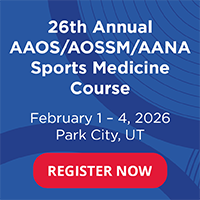26th Annual AAOS/AOSSM/AANA Sports Medicine Course
Learning Objectives
At the conclusion of this course, learners should be able to:
- Compare and contrast the various surgical and nonsurgical treatment protocols for instability conditions of the knee, injuries to knee ligaments, and cartilage disorders
- Review the common foot and ankle encountered in sports medicine practice as well as both nonoperative and operative management of Achilles tendon injuries, ligament tears, syndesmotic injuries and stress fractures
- Review the anatomy, function and injuries of the acromioclavicular joint of the shoulder, and both non-operative and operative treatment strategies for athletic AC joint injuries
- Evaluate indications for tenotomy vs. tenodesis for biceps tendon pathology
- Prescribe correct knee, shoulder and hand/wrist rehabilitation protocols to maximize post-surgical and post-injury function.
- Compare short-term and long-term treatment strategies for team physicians and important leadership skills
- Explain the latest techniques for ACL reconstruction, graft choices and augmentation options
- Review meniscal injuries and repair techniques
- Discuss evaluation of shoulder instability and the throwing athlete
- Review patellofemoral instability and surgical techniques to manage
- Evaluate rotator cuff tears and treatment options for small vs massive tears
- Compare and contrast Orthobiologic options for sports medicine
AMA Credit Designation
AAOS designates this live activity for a pending amount of AMA PRA Category 1 Credit(s)™. Physicians should claim only the credits commensurate with the extent of their participation in the activity.

For Physicians: The American Academy of Orthopaedic Surgeons is accredited by the Accreditation Council for Continuing Medical Education to provide continuing medical education (CME) for physicians.
